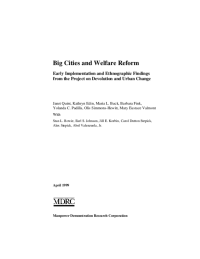Big Cities and Welfare Reform
Early Implementation and Ethnographic Findings from the Project on Devolution and Urban Change
The Personal Responsibility and Work Opportunity Reconciliation Act (PRWORA) of 1996 revolutionized welfare policy. Ending Aid to Families with Dependent Children (AFDC) — the 60-year-old federal cash welfare program for poor families — the act granted unprecedented authority and responsibility for public assistance policies and programs to the states, established a new form of aid known as Temporary Assistance for Needy Families (TANF), which provides funds to the states via block grants, and placed a five-year lifetime limit on federally assisted cash benefits for most families. States were permitted to exempt from the federal time limit no more than 20 percent of their average monthly caseloads and also faced increasingly stringent requirements to place more welfare recipients into jobs or work preparation activities. In the aftermath of PRWORA, states have further “devolved” much of the responsibility for welfare to local welfare agencies and other entities.
Congress enacted PRWORA and President Clinton signed it out of the profound conviction that the existing welfare system was a failure, but without much prior research to suggest what the likely effects of the new law’s provisions might be. PRWORA’s proponents expected the changes to spur policy innovation, lead more families to become self-supporting, and encourage marriage while discouraging out-of-wedlock births. The law’s critics predicted dire effects on poor families and the neighborhoods in which they live — more poverty, hardship, homelessness, domestic violence, and crime.
The fundamental premise underlying the Project on Devolution and Urban Change (Urban Change for short) is that the effects of PRWORA — whether positive, negative, or mixed — will be felt with special intensity by residents of the nation’s big cities, where long-term welfare recipients and other poor people are increasingly concentrated and employment opportunities are often limited. The Urban Change project is a five-year, multicomponent study of PRWORA’s implementation and of its effects on poor families with children, the communities in which they live, and the institutions that assist them. The study is taking place in four of the nation’s largest urban counties — Cuyahoga, Ohio (which includes Cleveland); Los Angeles, California; Miami-Dade, Florida; and Philadelphia, Pennsylvania. These counties (also referred to as the study’s sites) were selected to represent a mix of older Northern industrial cities and younger Sunbelt cities, with different local economies, welfare grant levels, and ethnic mixes. All four counties, however, account for a disproportionate share of the TANF recipients in their respective states.
The study is being undertaken by MDRC, a nonprofit, nonpartisan organization that develops and evaluates interventions designed to improve the self-sufficiency and well-being of economically disadvantaged populations, in cooperation with researchers from other institutions at or near the study sites. The project is supported by a consortium of 11 foundations, which are listed at the front of the report.
This report, the first from the project, centers on case studies of the four sites. These case studies contain information from two of the project’s components: the implementation study, which explores welfare agency policies and practices, and the ethnographic study, which centers on in-depth interviews with welfare families living in poor neighborhoods at the sites. Although the data for this report were collected approximately 10 to 20 months after the passage of PRWORA and the story has continued to unfold since that time, many of the issues and dilemmas identified in the early round of research are ones with which the sites are still grappling.






